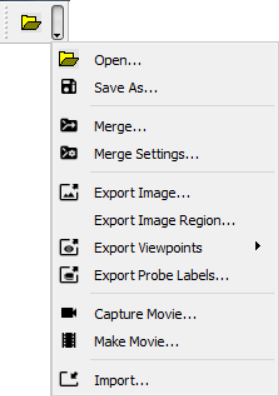Import
This command helps user to import various data files into VCollab Pro.
*.py (python script file to run set of commands)
*.csv (User defined result file )
*.vpt (Viewpoints file)
*.cax (Viewpoints from cax file)
How to run python script files?
Select Import option in the File toolbar,
Select Python script files (*.py),
Click open to run the script.
How to import viewpoints from external files?
Launch VCollabPro application.
Load a CAX (*.cax) file.
Click Import option in the File toolbar,
It pops up file browser dialog.
Select ‘Files of Type’ as VCollab Files (*.vpt) or VCollab Files (*.cax).
File browser dialog lists all either viewpoint files or CAX files.
Select a file.
Click Open to import all view paths from the external file.
Importing CAE Results
VCollab Pro supports importing of external CAE results from files in CSV (comma separated values) format. These results are added as new results or instances of existing results. VCollab Pro imports results only for the visible parts based on node or element numbers.
Sample CSV File
#VCOLLAB_RESULTS Node,Displacement,Stress, Vector,Tensor, #INSTANCE,L1M1,Label:Step1,Time:0.1 1818,0.000000,0.000000,0.000000,0.401617,-0.543105,-0.496605, 0.016011,1.541499,-0.090037, 1848,0.000000,0.000000,0.000000,-0.330866,-0.389335,-0.527343,-0.010698,1.284187,-0.019899, 1845,0.000000,0.000000,0.000000,-0.486035,-0.668757,-0.667392,-0.024487,1.603551,-0.030750, #INSTANCE,L2M1,Label:Step2,Time:0.2 1818,-0.543105,-0.496605, 0.016011,1.541499,0.000000,0.000000,0.000000,0.401617,-0.090037, 1848,-0.010698,1.284187,-0.0198990.000000,0.000000,0.000000,-0.330866,-0.389335,-0.527343, 1845,0.000000,0.000000,-0.486035,-0.6687570.000000,0.000000,0.000000,-0.486035,-0.668757, |
CSV File Format
Line No |
Description |
Example |
1 |
#VCOLLAB_RESULTS |
Header line to identify VCollab CSV format. |
2 |
Node/Element, Result1, Result2,…. |
Use Node for nodal result and Element for elemental result. All results should be of same type. |
3 |
Result Types for each result. |
Scalar / Vector / SixDof / Tensor For complex results: Scalr_RI / Vector_RI / SixDof_RI / Tensor_RI |
4 |
#INSTANCE, [Instance_name1], Instance attributes |
Each attribute should have key and value separated by ‘:’ For example, Time: 1.0, Label:Step-1, |
5 |
node/element ID value1, value2, value3,…. |
|
6 |
node/element ID value1, value2, value3,…. |
|
7 |
node/element ID value1, value2, value3,…. |
|
… |
#INSTANCE, [Instance_name2],Instance attributes |
Multiple instances are supported |
… |
… |
… |
… |
node/element ID value1, value2, value3,…. |
|
… |
node/element ID value1, value2, value3,…. |
|
… |
node/element ID value1, value2, value3,…. |
|
… |
Supported Result Types |
Number of Columns (Components) |
|---|---|
Scalar |
1 |
Vector |
3 |
SixDOF |
6 |
Tensor |
6 |
Python API Support
VCollab Pro provides the following methods to export and import result instances.
xExportCAEResult(ouput_file_path, result_list,instance_list, precision, scientific_format);
xImportCAEResult(csv_file_path);
Refer to VCollab Pro API manual available in the local installation folder for usage and syntax.
- Steps to Import Results from a CSV file
Launch VCollabPro application.
Load a CAX (*.cax) file
Click File | Import option.
It pops up file browser dialog.
Select ‘Files of Type’ as Result Files (*.csv)
File browser dialog lists all csv files.
Select VCollab supported csv file.
Click Open to import all CAE results.
Check ‘CAE | Results List’ for the result name / instance name.
